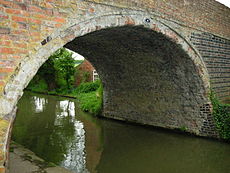Bugbrooke
| Bugbrooke | |
|---|---|
 Grand Union Canal near Bugbrooke |
|
| Bugbrooke shown within Northamptonshire | |
| Population | 2,773 (2001 Census) 2010 est. 2,924 |
| OS grid reference | SP680575 |
| • London | 74 miles (119 km) |
| Civil parish |
|
| District | |
| Shire county | |
| Region | |
| Country | England |
| Sovereign state | United Kingdom |
| Post town | NORTHAMPTON |
| Postcode district | NN7 3.. |
| Dialling code | 01604 |
| Police | Northamptonshire |
| Fire | Northamptonshire |
| Ambulance | East Midlands |
| EU Parliament | East Midlands |
| UK Parliament | |
Bugbrooke is a large village and civil parish in Northamptonshire, England, on a ridge overlooking the valley of the River Nene.
It is about 7 miles (11.3 km) south west of Northampton. The M1, one of the busiest motorways in England, is about 2 miles (3.2 km) by the shortest route to junction 16.
The 2001 census shows a population of 2,773 people, 1,376 males and 1,397 female in 1,029 households. The 2010 population estimate is 2,924 and the district council has classified it as able to expand further.
Following boundary changes, Bugbrooke remains part of the Parliamentary Constituency of Daventry. It is considered a "safe" Conservative seat. At the May 2015 general election, the Daventry seat was retained by the Conservative candidate, Christopher Heaton Harris.
Bugbrooke is in South Northamptonshire Council's two-member "Heyfords and Bugbrooke" ward, covering the village as well as neighbouring Nether Heyford and Upper Heyford.
From May 2013, the Northamptonshire County Council seat of Bugbrooke joins with 10 other parish councils to form Bugbrooke division.
Bugbrooke Parish Council meets monthly and is re-elected every four years.
Bugbrooke has an Anglican church, dedicated to St Michael and All Angels which dates from the 13th century. There are monuments to the Whitfield family from 1704 and 1734. There is an early 19th-century rectory west of the church.
The Baptist chapel is dated 1808. A row of yellow-brick cottages east of the chapel past the brook were built in 1844 in the Gothic style by Edmund Francis Law and were originally a National School with accommodation for the master.
...
Wikipedia

